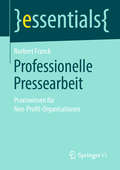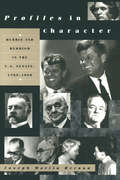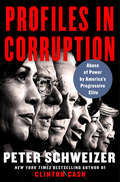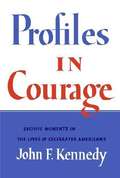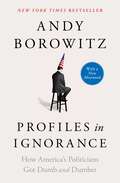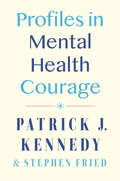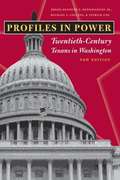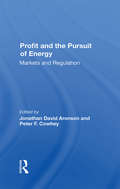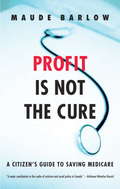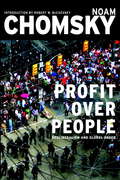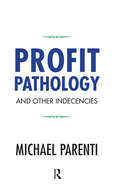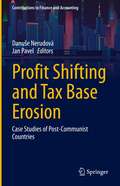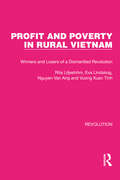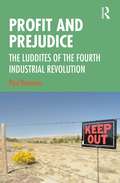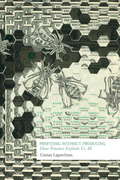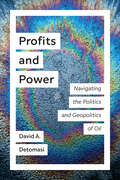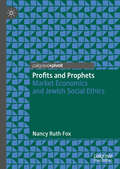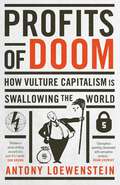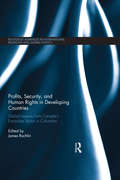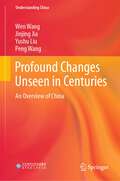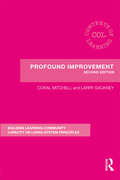- Table View
- List View
Professionelle Pressearbeit: Praxiswissen für Non-Profit-Organisationen (essentials)
by Norbert FranckDieses essential vermittelt das Know-how für einen erfolgreichen Umgang mit den entscheidenden Instrumenten jeder Pressearbeit. Im Mittelpunkt stehen praxisorientierte Antworten auf zentrale Fragen jeder Pressearbeit: Wie erzielt eine Non-Profit-Organisation (NPO) mit ihrer Pressearbeit Aufmerksamkeit und Reputation? Wie sind Informationen aufzubereiten, dass sie das Interesse von Journalistinnen und Journalisten wecken? Wie mit Journalistinnen und Journalisten – auch in kritischen Situationen – professionell umgehen? Wie Krisensituationen durch gekonnte Pressearbeit meistern?
Professionelle Unterrichtswahrnehmung im sozialwissenschaftlichen Fachunterricht: Das Potential von Animationsfilmen realer Unterrichtsszenen für die Lehrer*innenbildung (Politische Bildung)
by Sabine Manzel Katrin Hahn-Laudenberg Dorothee Gronostay Jutta TeuwsenDieses Open-Access-Buch bietet theoretische Grundlagen und praktische Beispiele zur Förderung der professionellen Unterrichtswahrnehmung von (angehenden) Lehrkräften im sozialwissenschaftlichen Fachunterricht. Im Fokus steht das Potential von Animationsfilmen realer Unterrichtsszenen, die mit diesem Band erstmals als innovatives Lehr-/Lernmedium für die Lehrer*innenbildung vorgestellt werden. Die Autor*innen konzeptionalisieren einen fachdidaktischen Zugang zum allgemeindidaktischen Modell der professional vision und präsentieren systematisch erprobte und modular einsetzbare Lehr-/Lernmaterialien zur Arbeit mit Animationsfilmen in der Lehrer*innenbildung. Alle vorgestellten Lehr-/Lernmaterialien sowie die Animationsfilme von Unterricht sind für Interessierte frei zugänglich und im Band entsprechend verlinkt.
Profiles in Character: Hubris and Heroism in the U.S. Senate, 1789-1996
by Joseph Martin HernonA take-off of Kennedy's Profiles in Courage, which argues that the best-known US senators don't deserve their renown as much as some lesser-known ones. Over the course of ten biographical chapters, this book tells the story of 16 men's lives in the Senate in relation to each other.
Profiles in Corruption: Abuse of Power by America's Progressive Elite
by Peter SchweizerWashington insiders operate by a proven credo: when a Peter Schweizer book drops, duck and brace for impact. <p><p> For over a decade, the work of five-time New York Times bestselling investigative reporter Peter Schweizer has sent shockwaves through the political universe. Clinton Cash revealed the Clintons’ international money flow, exposed global corruption, and sparked an FBI investigation. Secret Empires exposed bipartisan corruption and launched congressional investigations. And Throw Them All Out and Extortion prompted passage of the STOCK Act. Indeed, Schweizer’s “follow the money” bombshell revelations have been featured on the front pages of the New York Times and the Wall Street Journal, and regularly appear on national news programs, including 60 Minutes. <p> Now Schweizer and his team of seasoned investigators turn their focus to the nation’s top progressives—politicians who strive to acquire more government power to achieve their political ends. <p> Can they be trusted with more power?In Profiles in Corruption, Schweizer offers a deep-dive investigation into the private finances, and secrets deals of some of America’s top political leaders. And, as usual, he doesn’t disappoint, with never-before-reported revelations that uncover corruption and abuse of power—all backed up by a mountain of corporate documents and legal filings from around the globe. Learn about how they are making sweetheart deals, generating side income, bending the law to their own benefits, using legislation to advance their own interests, and much more. <p> Profiles in Corruption contains tomorrow’s headlines. <p><b>A New York Times Bestseller</b>
Profiles in Courage
by John Fitzgerald Kennedy"This is a book about that most admirable of human virtues--courage... and these are the stories of the pressures experienced by eight United States Senators and the grace with which they endured them--the risks to their careers, the unpopularity of their courses, the defamation of their characters, and sometimes, but sadly only sometimes, the vindication of their reputations and their principles." <P><P> During 1954-1955, John F. Kennedy, then a U.S. Senator, chose eight of his historical colleagues to profile for their acts of astounding integrity in the face of overwhelming opposition. These heroes include John Quincy Adams, Daniel Webster, Thomas Hart Benton, and Robert A. Taft. <P><P> Awarded the Pulitzer Prize in 1957, Profiles in Courage resounds with timeless lessons on the most cherished of virtues and is a powerful reminder of the strength of the human spirit.
Profiles in Ignorance: How America's Politicians Got Dumb and Dumber
by Andy BorowitzAndy Borowitz, “one of the funniest people in America” (CBS Sunday Morning), brilliantly examines the intellectual deterioration of American politics, from Ronald Reagan to Dan Quayle, from George W. Bush to Sarah Palin, to its apotheosis in Donald J. Trump. <p><p>The winner of the first-ever National Press Club award for humor, Andy Borowitz has been called a “Swiftian satirist” (The Wall Street Journal) and “one of the country’s finest satirists” (The New York Times). Millions of fans and New Yorker readers enjoy his satirical news column “The Borowitz Report.” Now, in Profiles in Ignorance, he offers a witty, spot-on diagnosis of our country’s political troubles by showing how ignorant leaders are degrading, embarrassing, and endangering our nation. <p><p>Borowitz argues that over the past fifty years, American politicians have grown increasingly allergic to knowledge, and mass media have encouraged the election of ignoramuses by elevating candidates who are better at performing than thinking. Starting with Ronald Reagan’s first campaign for governor of California in 1966 and culminating with the election of Donald J. Trump to the White House, Borowitz shows how, during the age of twenty-four-hour news and social media, the US has elected politicians to positions of great power whose lack of the most basic information is terrifying. In addition to Reagan, Quayle, Bush, Palin, and Trump, Borowitz covers a host of congresspersons, senators, and governors who have helped lower the bar over the past five decades. <p><p>Profiles in Ignorance aims to make us both laugh and cry: laugh at the idiotic antics of these public figures, and cry at the cataclysms these icons of ignorance have caused. But most importantly, the book delivers a call to action and a cause for optimism: History doesn’t move in a straight line, and we can change course if we act now. <p> <b>New York Times Bestseller</b>
Profiles in Mental Health Courage
by Stephen Fried Patrick J. KennedyOne of Harvard Public Health Magazine's Best Public Health Books of the YearProfiles in Mental Health Courage portrays the dramatic journeys of a diverse group of Americans who have struggled with their mental health. This book offers deeply compelling stories about the bravery and resilience of those living with a variety of mental illnesses and addictions. Several years ago, Patrick J. Kennedy shared the story of his personal and family challenges with mental illness and addiction—and the nation&’s—in his bestselling memoir, A Common Struggle. Now, he and his Common Struggle coauthor, award-winning healthcare journalist Stephen Fried, have crafted this powerful new book sharing the untold stories of others—a special group who agreed to talk about their illnesses, treatments, and struggles for the first time. When Kennedy&’s uncle, President John F. Kennedy, published his classic book Profiles in Courage, he hoped to inspire &“political courage&” by telling the stories of brave U.S. senators who changed America. In Profiles in Mental Health Courage, former Congressman Kennedy adapts his uncle&’s idea to inspire the &“mental health courage&” it takes for those with these conditions to treat their illnesses, and risk telling their stories to help America face its crisis in our families, our workplaces, our jails, and on our streets. The resounding silence surrounding these illnesses remains persistent, and this book takes an unflinching look at the experience of mental illness and addiction that inspires profound connection, empathy, and action.In this book, you&’ll meet people of all ages, backgrounds, and futures, across politics and government, Hollywood and the arts, tech and business, sports and science—some recovering, some relapsing, some just barely holding on, but all sharing experiences and insights we need to better understand. You&’ll also meet those trying to help them through—parents, siblings, spouses, therapists, bosses, doctors, and friends who create the extended families needed to support care and wellness. The personal stories they share with Kennedy and Fried are intimate, sometimes shocking, always revealing. And they are essential reading for caregivers, family members, policymakers, and the general public—just as they are for those who often feel alone in experiencing these challenges themselves.
Profiles in Power: Twentieth-Century Texans in Washington, New Edition
by Kenneth E. Patrick Cox Michael L. Collins Jr. HendricksonProfiles in Power offers concise biographies of fourteen twentieth-century Texans who wielded significant political power and influence in Washington, D.C. First published in 1993 by Harlan Davidson, it has been revised and updated with new chapters on John Nance Garner and Henry Gonzalez and expanded chapters on Lyndon Johnson, Barbara Jordan, Ralph Yarborough, Jim Wright, and John Tower. Demonstrating the validity of a biographical approach to history, the book as a whole covers all the major political issues of the twentieth century, as well as the pivotal role of Texans in defining the national agenda.
Profiles, Probabilities, and Stereotypes
by Frederick SchauerThis book employs a careful, rigorous, yet lively approach to the timely question of whether we can justly generalize about members of a group on the basis of statistical tendencies of that group. For instance, should a military academy exclude women because, on average, women are more sensitive to hazing than men? Should airlines force all pilots to retire at age sixty, even though most pilots at that age have excellent vision? Can all pit bulls be banned because of the aggressive characteristics of the breed? And, most controversially, should government and law enforcement use racial and ethnic profiling as a tool to fight crime and terrorism? Frederick Schauer strives to analyze and resolve these prickly questions. When the law "thinks like an actuary"--makes decisions about groups based on averages--the public benefit can be enormous. On the other hand, profiling and stereotyping may lead to injustice. And many stereotypes are self-fulfilling, while others are simply spurious. How, then, can we decide which stereotypes are accurate, which are distortions, which can be applied fairly, and which will result in unfair stigmatization? These decisions must rely not only on statistical and empirical accuracy, but also on morality. Even statistically sound generalizations may sometimes have to yield to the demands of justice. But broad judgments are not always or even usually immoral, and we should not always dismiss them because of an instinctive aversion to stereotypes. As Schauer argues, there is good profiling and bad profiling. If we can effectively determine which is which, we stand to gain, not lose, a measure of justice.
Profit And The Pursuit Of Energy: Markets And Regulation
by Jonathan D Aronson Peter F CowheyAmong the books on the world energy crisis, on technological possibilities for self-sufficiency, and on various energy sources, this is one of a very few to address the practicalities of government regulatory responsibilities versus the pursuit of profit in the private sector and to look at the processes, logistics, and complex interactions among private energy companies, financial sectors, and national governments. The authors provide answers to such questions as: How do oil company operations influence government policies? What kinds of energy projects can be financed by existing financial institutions? How does the availability of insurance affect innovations in energy? They also examine how major investors and governments make decisions about the management of the volatile mix of political, economic, and technological risks that buffet the energy sector; critique the conventional wisdom concerning the major fuels; and project the likely evolution of the world energy market over the next decade.
Profit Is Not the Cure
by Maude BarlowOn July 12, 1966, the Medical Care Insurance Act was passed by the federal House of Commons after a ferocious public debate that pitted the vast majority of Canadians against a powerful alliance of business, insurance companies, and doctors.More than thirty years later, the same battle is being fought all over again. Only now, the forces opposed to medicare are more ideologically unified, more richly endowed, and tied to transnational corporations whose power exceeds that of entire countries.In Profit Is Not the Cure, Maude Barlow traces the history of medicare in Canada. She compares it with both public and private systems in other parts of the world. And she contrasts it with the brutally divisive system that exists in the United States, where forty-four million people have no medical insurance, and millions more get minimal care through profit-driven health maintenance organizations. From the point of view of most patients, the United States health-care model is a disaster. But the proponents of privatization in Canada, supported by the right-wing media and corporate lobbyists, are determined to impose American-style "reforms" on the Canadian public. Three provinces - British Columbia, Alberta, and Ontario - are moving ahead rapidly to enlarge the role of commerce in the provision of health-care services. They are introducing user fees, delisting procedures that previously were covered, and encouraging private corporations to move into areas that used to be the exclusive domain of the public system.While the prime minister and federal cabinet have paid lipservice to the principles of medicare, they have made it clear by their actions that they will do nothing to impede the destruction of those principles by the provinces. In fact, their enthusiastic support of NAFTA, and the impending Free Trade Agreement of the Americas (FTAA) and General Agreement on Trade in Services (GATS), has made the defence of medicare increasingly difficult. Canadians overwhelmingly support medicare. Many, however, have been persuaded that it is a luxury we can no longer afford. Maude Barlow argues that this proposition is wrong. An earlier generation fought a bitter battle to bring medicare into existence. Another battle must be fought now to save it. But we owe it to the founders of the system, as well as to future generations, to take up the cause again. This important book shows the way.From the Hardcover edition.
Profit Over People: Neoliberalism and Global Order
by Noam ChomskyWhy is the Atlantic slowly filling with crude petroleum, threatening a millions-of-years-old ecological balance? Why did traders at prominent banks take high-risk gambles with the money entrusted to them by hundreds of thousands of clients around the world, expanding and leveraging their investments to the point that failure led to a global financial crisis that left millions of people jobless and hundreds of cities economically devastated? Why would the world's most powerful military spend ten years fighting an enemy that presents no direct threat to secure resources for corporations? The culprit in all cases is neoliberal ideology--the belief in the supremacy of "free" markets to drive and govern human affairs. And in the years since the initial publication of Noam Chomsky's Profit Over People: Neoliberalism and Global Order, the bitter vines of neoliberalism have only twisted themselves further into the world economy, obliterating the public's voice in public affairs and substituting the bottom line in place of people's basic obligation to care for one another as ends in themselves. In Profit Over People, Chomsky reveals the roots of the present crisis, tracing the history of neoliberalism through an incisive analysis of free trade agreements of the 1990s, the World Trade Organization, and the International Monetary Fund--and describes the movements of resistance to the increasing interference by the private sector in global affairs. In the years since the initial publication of Profit Over People, the stakes have only risen. Now more than ever, Profit Over People is one of the key texts explaining how the crisis facing us operates--and how, through Chomsky's analysis of resistance, we may find an escape from the closing net.
Profit Pathology and Other Indecencies
by Michael ParentiFrom market crisis to market boom, from welfare to wealth care, from homelessness to helplessness, and an all-out assault on the global environment-these are just some of the indecencies of contemporary economic life that Profit Pathology takes on. Here, Michael Parenti investigates how class power is a central force in our political life and, yet, is subjected to little critical discernment. He notes how big-moneyed interests shift the rules of the game in their favor while unveiling the long march by reactionaries through the nation's institutions to undo all the gains of social democracy, from the New Deal to the present. Parenti also traces the exploitative economic forces that have operated through much of American history, including the mass displacement and extermination of Native Americans and the enslavement of Africans. Parenti is a master at demonstrating the impact of monomaniacal profit accumulation on social services-especially health care-and human values. Here he takes us one step further, showing how unrestrained capitalism ultimately endangers itself, becoming a "self-devouring beast" that threatens us all. Finally, he calls for a solution based on democratic diversity and public ownership-"because it works."
Profit Pathology and Other Indecencies
by Michael ParentiFrom market crisis to market boom, from welfare to wealth care, from homelessness to helplessness, and an all-out assault on the global environment-these are just some of the indecencies of contemporary economic life that Profit Pathology takes on. Here, Michael Parenti investigates how class power is a central force in our political life and, yet, is subjected to little critical discernment. He notes how big-moneyed interests shift the rules of the game in their favor while unveiling the long march by reactionaries through the nation's institutions to undo all the gains of social democracy, from the New Deal to the present. Parenti also traces the exploitative economic forces that have operated through much of American history, including the mass displacement and extermination of Native Americans and the enslavement of Africans. Parenti is a master at demonstrating the impact of monomaniacal profit accumulation on social services-especially health care-and human values. Here he takes us one step further, showing how unrestrained capitalism ultimately endangers itself, becoming a "self-devouring beast" that threatens us all. Finally, he calls for a solution based on democratic diversity and public ownership-"because it works."
Profit Shifting and Tax Base Erosion: Case Studies of Post-Communist Countries (Contributions to Finance and Accounting)
by Danuše Nerudová Jan PavelThis book provides a comprehensive analysis of current techniques for profit shifting and tax base erosion in the area of corporate taxation and measurement. Firstly, it explains the relevance of the issue at hand – profit shifting and base erosion in the context of the 21st century. In turn, the book provides a comprehensive analysis of available techniques for the identification and measurement of profit shifting and base erosion, which adopt both the macro and micro perspective. It also provides examples from selected post-communist countries now in the EU, including the Czech Republic, Poland and Hungary. Concrete recommendations for economic policy round out the coverage.
Profit and Poverty in Rural Vietnam: Winners and Losers of a Dismantled Revolution (Routledge Library Editions: Revolution #24)
by Rita Liljeström Eva Lindskog Nguyen Van Ang Vuong Xuan TinhThis book, first published in 1998, studies the social impact of Doi Moi, a policy of economic renovation, on the living conditions in state forest enterprises and agricultural cooperatives in northern Vietnam. It compares the authors’ findings with those of 1987, before the formal adoption of the new economic policies – essentially the opening up of the economy to market forces.
Profit and Prejudice: The Luddites of the Fourth Industrial Revolution
by Paul DonovanAvoiding prejudice will be critical to economic success in the fourth industrial revolution. It is not the new and innovative technology that will matter in the next decade, but what we do with it. Using technology properly, with diverse decision making, is the difference between success and failure in a changing world. This will require putting the right person in the right job at the right time. Prejudice stops that happening. Profit and Prejudice takes us through the relationship between economic success and prejudice in labour markets. It starts with the major changes that occur in periods of economic upheaval. These changes tend to be unpopular and complex – and complexity encourages people to turn to the simplistic arguments of ‘scapegoat economics’ and prejudice. Some of the changes of the fourth industrial revolution will help fight prejudice, but some will make it far worse. The more prejudice there is, the harder it will be for companies and countries to profit from the changes ahead. Profit is not the main argument against prejudice, but can certainly help fight it. This book tells a story of the damage that prejudice can do. Using economics without jargon, students, investors and the public will be able to follow the narrative and see how prejudice can be opposed. Prejudice is bad for business and the economy. Profit and Prejudice explains why.
Profiting Without Producing
by Costas LapavitsasFinancialization is one of the most innovative concepts to emerge in the field of political economy during the last three decades, although there is no agreement on what exactly it is. Profiting Without Producing puts forth a distinctive view defining financialization in terms of the fundamental conduct of non-financial enterprises, banks and households. Its most prominent feature is the rise of financial profit, in part extracted from households through financial expropriation. Financialized capitalism is also prone to crises, none greater than the gigantic turmoil that began in 2007. Using abundant empirical data, the book establishes the causes of the crisis and discusses the options broadly available for controlling finance.
Profits and Power: Navigating the Politics and Geopolitics of Oil (UTP Insights)
by David A. DetomasiOil fuels the global economy and remains a staple of our energy system. Yet, its production and use continue to draw negative criticism, and an increasing number of people want to reduce or eliminate its use altogether. Profits and Power sheds light on how the oil system works, its key players, and the political and geopolitical issues related to its use. Starting in the second half of the nineteenth century, the book traces the fascinating history of how oil production and its sale became the world’s most profitable business. Tracing distinct eras in oil’s past, Profits and Power shows how periods defined by shifts in price often dictated who controlled production, and who enjoyed the often enormous riches oil production generated. David A. Detomasi weaves together politics, geopolitics, and economics to provide a complete picture of how the system really works, and what direction it will take in the future. As the world becomes increasingly aware of the dangers and challenges oil dependency creates, knowledge of this crucial commodity has never been more relevant and critical for humanity’s future. Profits and Power will resonate with anyone interested in, or charged with responding to, our evolving energy future.
Profits and Prophets: Market Economics and Jewish Social Ethics
by Nancy Ruth FoxThis book is a study of potential, perceived, and real conflicts and similarities between market economics and Jewish social justice. The book’s ultimate focus is on public policy issues. In the first two chapters, the author presents the conceptual and theoretical foundations of market economics and Jewish social justice. Subsequent chapters analyze minimum wage, immigration, climate change, and usury from both market economics and Jewish social justice perspectives, discussing conflicts, and, if they exist, similarities.
Profits of Doom: How vulture capitalism is swallowing the world: Updated Edition
by Antony LoewensteinVulture capitalism has seen the corporation become more powerful than the state, and yet its work is often done by stealth, supported by political and media elites. The result is privatised wars and outsourced detention centres. Mining companies pillaging precious land in developing countries and struggling nations are invaded by NGOs and the corporate dollar. Best-selling journalist Antony Loewenstein travels to Afghanistan, Pakistan, Haiti, Papua New Guinea and across Australia to witness the reality of this largely hidden world of privatised detention centres, the cost of cheap clothing manufacturing and militarised private security. Who is involved and why? Can it be stopped? What are the alternatives in a globalised world? Profits of Doom challenges the fundamentals of our unsustainable way of life and the money-making imperatives driving it.Endorsements for Profits of Doom: 'In Australia, so often bereft of voices of dissent and courage, Antony Loewenstein's tenacious work stands out. Profits of Doom is a journey into a world of mutated economics and corrupt politics that we ignore at our peril.' - John Pilger, independent investigative journalist, author and documentary film-maker 'A great exercise in joining the dots, on essential terrain that too often is ignored. At a time when rapacious private interests campaign to destroy government - so they can cash in on its absence - Loewenstein reports from the frontline in an insidious war.' - Paul McGeough, author of Kill Khalid and chief foreign correspondent for The Sydney Morning Herald 'The competition for the most depraved example of the predatory state capitalism of the Reagan-Thatcher neoliberal era is fierce. In this chilling study, based on careful and courageous reporting, and illuminated with perceptive analysis, Antony Loewenstein presents many competitors for the prize, while also helping us understand all too well the saying that man is a wolf to man.' - Noam Chomsky, Institute Professor at MIT and Professor of Linguistics and Philosophy, political activist and author 'Profits of Doom nails the mad idea that the drive for profits will create global wellbeing. Antony Loewenstein delivers a spine-chilling account of the post 9/11 world taken over by vulture capitalism and its political cronies. And this is what we are voting for.' - Bob Brown, former leader of the Australian Greens and director of Sea Shepherd 'Antony Loewenstein's Profits of Doom is a powerful indictment of the corporations and governments across the globe whose unquenchable thirst for resources and power threaten the stability - perhaps even the very existence - of the planet. Loewenstein is no armchair academic or cubicle journalist. The stories in the book are the product of years embedded, in military and economic warzones, with the disempowered of the world, the people from Pakistan to Papua New Guinea and beyond who have the audacity and bravery to fight back against all odds. Loewenstein's keen sense of justice is evident on every page of this book as he gives voice to the voiceless and confronts the powerful. Profits of Doom is a devastating, incisive follow-up to Naomi Klein's The Shock Doctrine.' - Jeremy Scahill, international best-selling author of Dirty Wars and Blackwater
Profits, Security, and Human Rights in Developing Countries: Global Lessons from Canada’s Extractive Sector in Colombia (Routledge Advances in International Relations and Global Politics #122)
by James RochlinThe extractive sector is a particular area of expertise for Canada and more than half of Canada’s mining assets abroad are located in Latin America, specifically in Brazil, Peru, Chile, and Colombia. The Canada-Colombia accord was the first free-trade agreement in the world to include annual Human Rights Impact Assessments (HRIA), and also includes a labour side accord where abuse complaints can be formally registered. Using Colombia as a case study, James Rochlin and his international and multidisciplinary line up of Canadian and Colombian scholars, and activists working in the area of human rights, and the judiciary explore: What is the best way to identify and operationalize for mutual benefit the concentric space between the interests of extractive corporations in profit and security, on the one hand, and the interests of the host communities in the promotion of human rights and human security, on the other? What can the four emblematic and diverse cases in Colombia (Meta, Sergovia, Marmato, and Bolivar/La Guajira) tell us about how to fine tune and improve a newly implemented governmental HRIA to render it an increasingly useful global instrument to promote simultaneously corporate security and human security for host communities? What is the most efficient and effective way to design and implement Corporate Social Responsibility Programs in a manner that promotes simultaneously corporate security and community human security? Written in a clear and accessible style, Profits, Security, and Human Rights presents practical lessons on how to promote both corporate security and human security in communities where the extractive sector operates in the Global South.
Profound Changes Unseen in Centuries: An Overview of China (Understanding China)
by Peng Wang Wen Wang Jinjing Jia Yushu LiuThis book focuses on the current internal and external situation China is facing both from a macro perspective and a theoretical height, and puts forward practical development strategies and diplomatic ideas. It is of great methodological significance. At home, the development thought after the conclusion of the hundred-year change is the guiding thought for China's further development, and abroad, the international communication and the construction of international order highlighted by the hundred-year change also have important reference significance for the world's development.
Profound Improvement: Building Capacity for a Learning Community (Contexts of Learning)
by Coral Mitchell Larry SackneyThe book discusses the idea of the learning community as a vehicle for professional learning and school development. As the authors show, the learning community develops in response to building capacity in three domains: personal, interpersonal and organizational. In the personal domain, educators deconstruct and reconstruct their professional narratives to enhance student learning and professional practice. In the interpersonal domain, educators generate norms and values that foster experimentation and critical analysis of educational practice and that promote collective and individual learning. In the organizational domain, visible and invisible structures are constructed that enable community members to enact educational practices in support of profound improvement in teaching and learning. This revised and updated edition of Profound Improvement not only brings this important work up-to-date but also shows how the authors thinking has changed and developed since the book was originally written. The book focuses on the life of educators as it relates to professional learning and growth. It is concerned with human growth and development, human cognition and affect and human interactions and actions in the context of a school community. For the new edition the authors also: elaborate more fully the notion of learning communities based on living systems and ecological perspectives develop their capacity building model They show that building a learning community is a dynamic process that engages the individual, the group and the organization in embedded interdependencies and mutual influences. As the authors clearly demonstrate: education is a living system as opposed to a managed system.
Profusely Illustrated: A Memoir
by Edward SorelThe fabulous life and times of one of our wittiest, most endearing and enduring caricaturists—in his own words and inimitable art. Sorel has given us "some of the best pictorial satire of our time ... [his] pen can slash as well as any sword&” (The Washington Post).Alongside more than 172 of his drawings, cartoons, and caricatures—and in prose as spirited and wickedly pointed as his artwork—Edward Sorel gives us an unforgettable self-portrait: his poor Depression-era childhood in the Bronx (surrounded by loving Romanian immigrant grandparents and a clan of mostly left-leaning aunts and uncles); his first stabs at drawing when pneumonia kept him out of school at age eight; his time as a student at New York&’s famed High School of Music and Art; the scrappy early days of Push Pin Studios, founded with fellow Cooper Union alums Milton Glaser and Seymour Chwast, which became the hottest design group of the 1960s; his two marriages and four children; and his many friends in New York&’s art and literary circles. As the &“young lefty&” becomes an &“old lefty,&” Sorel charts the highlights of his remarkable life, by both telling us and showing us how in magazines and newspapers, books, murals, cartoons, and comic strips, he steadily lampooned—and celebrated—American cultural and political life. He sets his story in the parallel trajectory of American presidents, from FDR&’s time to the present day—with the candor and depth of insight that could come only from someone who lived through it all. In Profusely Illustrated, Sorel reveals the kaleidoscopic ways in which the personal and political collide in art—a collision that is simultaneously brilliant in concept and uproarious and beautiful in its representation.
